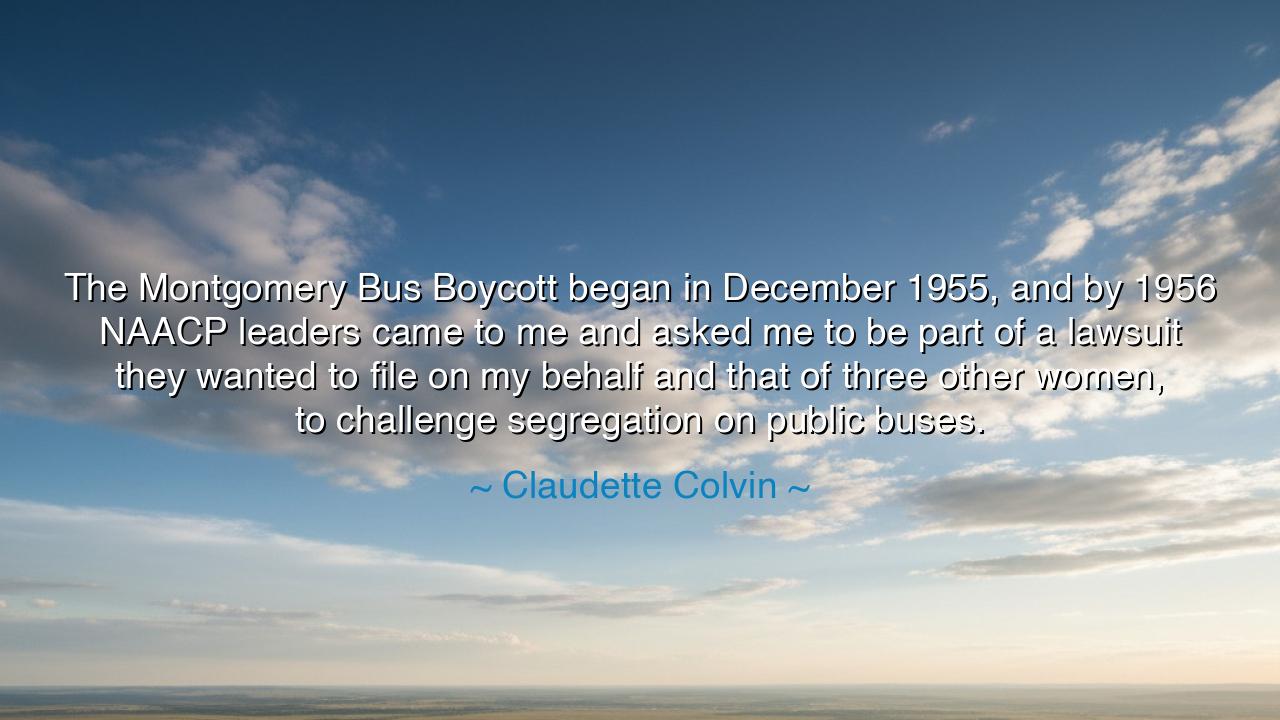
The Montgomery Bus Boycott began in December 1955, and by 1956
The Montgomery Bus Boycott began in December 1955, and by 1956 NAACP leaders came to me and asked me to be part of a lawsuit they wanted to file on my behalf and that of three other women, to challenge segregation on public buses.






When Claudette Colvin declared, “The Montgomery Bus Boycott began in December 1955, and by 1956 NAACP leaders came to me and asked me to be part of a lawsuit they wanted to file on my behalf and that of three other women, to challenge segregation on public buses,” she spoke as one whose courage had already altered the course of history. Her words reveal that revolutions are not born in abstract speeches alone, but in the lived defiance of ordinary people. At only fifteen years old, Colvin refused to give up her seat on a segregated bus—an act of rebellion that lit the torch carried later by others.
The Montgomery Bus Boycott was more than a protest; it was a spiritual rising. Sparked by the refusal of Rosa Parks and strengthened by Colvin and others, it became a year-long testament to the power of unity. Thousands of Black citizens walked miles each day rather than yield to the injustice of segregation. Their sacrifice was the living embodiment of Colvin’s choice: to challenge a system designed to humiliate and oppress.
The lawsuit that Colvin joined—Browder v. Gayle—became the weapon that struck at the very root of segregation. While the boycott showed the strength of the people, the case in the courts dismantled the legal foundation of Jim Crow on buses. When the Supreme Court ruled that such segregation was unconstitutional, it was the voices and courage of Colvin and three other women that gave the final blow. Thus, her words remind us that behind every victory are those who dared to place their names, and their lives, in the path of history.
The ancients, too, honored such bravery. They told of youths who defied kings, of citizens who stood alone against tyrants, and of women whose acts of defiance changed the fate of nations. Colvin belongs to this lineage of heroes. She did not wait for age, wealth, or status to grant her permission—she acted because her dignity demanded it.
Thus, let this wisdom endure: the fire of justice is often lit by the young and the overlooked, those whom history first ignores but later must honor. Claudette Colvin’s words are not merely memory—they are prophecy, reminding us that every act of defiance, however small it may seem, can grow into a movement that shakes the pillars of oppression. For the Montgomery Bus Boycott was not the work of one alone, but of many, bound together by courage, and led by the voices of women who would not yield.






ANNGUYEN THI ANH NGUYET
Claudette Colvin's involvement in the NAACP's legal case against segregation speaks to the bravery and determination of individuals who are often left out of mainstream history. What does her story teach us about the importance of standing up against injustice, even when the world may not immediately recognize the significance of those actions? Could focusing more on stories like hers inspire a new generation to take action against societal inequalities?
HDHanh Duong
Claudette Colvin’s role in the early stages of the Montgomery Bus Boycott raises important questions about how movements are remembered and who gets credit. Why do we remember certain activists while others fade into the background? Is it due to their actions being overshadowed by others, or perhaps the way their actions fit into the larger narrative of the movement? How can we shift our focus to highlight the collective effort rather than singular figures?
YNLe Nguyen Yen Nhi
This quote brings attention to the often-overlooked contributions of individuals like Claudette Colvin, who played a critical role in challenging segregation long before the more widely recognized figures. How many others have been lost to history in similar ways? Could Colvin’s experience shed light on how the legacy of social movements is shaped by who gets to tell the story? What can we do to ensure that all contributors are remembered appropriately?
TCTien Cuong
Colvin's involvement in the Montgomery Bus Boycott is often forgotten in favor of other figures, but her courage and the legal fight she helped initiate were critical. What does it mean to be a 'first' in such a movement, and why are the contributions of young people like Colvin sometimes dismissed? How do societal perceptions of age, race, and gender affect who is recognized in history, even when their actions are equally impactful?
GDGold D.dragon
Claudette Colvin’s statement highlights an important turning point in the Civil Rights Movement, but it also raises the question: Why is her role often overshadowed by Rosa Parks, despite Colvin’s similar act of defiance? What does this say about how history remembers certain figures and movements? Does it suggest that some stories are selectively remembered while others are not, even when they played pivotal roles in social change?